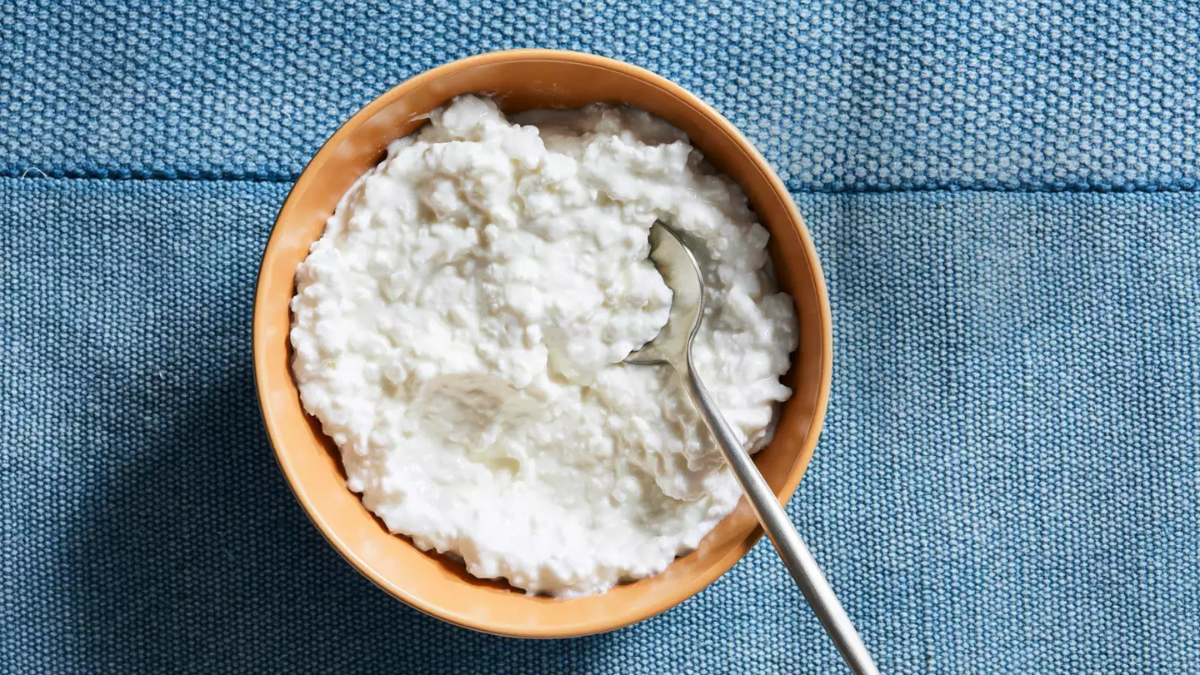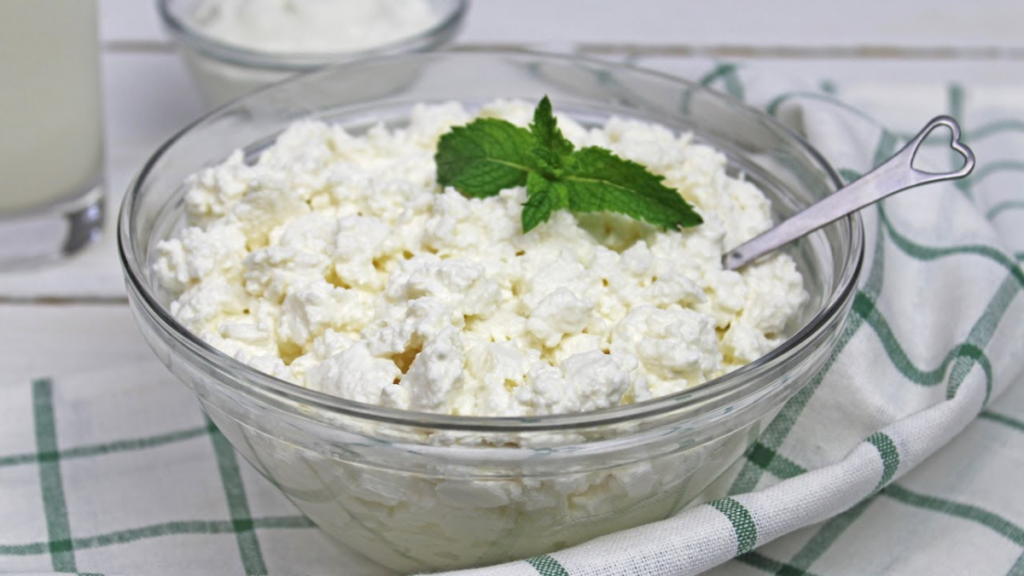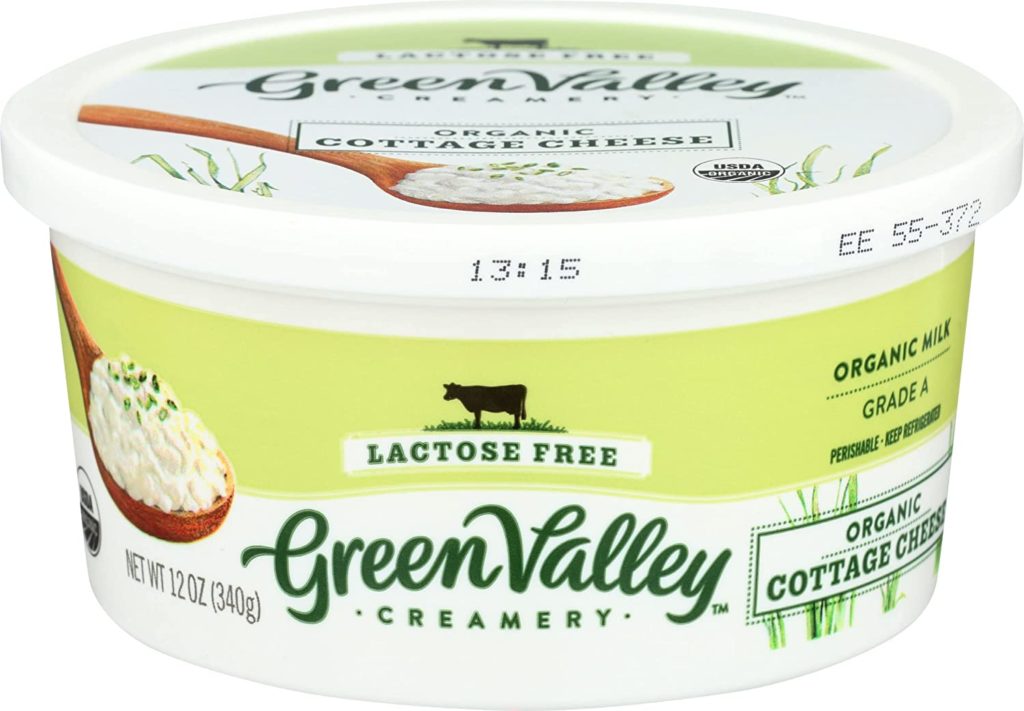Cottage cheese is a delicious snack since it is rich, full of texture, and high in protein. This dairy product, also known as curds and whey, varies from cheese in that it is not matured before being sold and eaten. When compared to other cheeses, it is also low in calories.
Cottage cheese has a long and illustrious history as a superfood. While it is likely that other varieties of the product existed thousands of years ago, the product as we know it now gained popularity. When the United States Department of Agriculture advertised it as a top protein source, the purpose of the USDA was to save as much beef as possible for soldiers stationed overseas. Cottage cheese remained popular as a diet item after the war. During the 1970s, it was at the height of its popularity. Cottage cheese has lost ground to yogurt, but it is still a fantastic dairy alternative for those on a diet.
What is Cottage Cheese?
Cottage cheese is a soft, creamy white cheese. It’s a fresh cheese, so it doesn’t undergo the aging or ripening process to acquire flavor. As a result, when compared to matured cheeses, it has a fairly mild flavor. Cottage cheese is created from the curds of pasteurized cow’s milk of varying fat levels, such as nonfat, reduced-fat, or standard milk.
It’s also available in various curd sizes, often small, medium, or giant. It also comes in cream, whipped, lactose-free, reduced sodium, and sodium-free versions. This versatile cheese can be eaten on its own or used as a dish component.
Cottage Cheese Nutrition Facts
Here’s a table with the nutrition facts for 1 cup (226g) of low-fat cottage cheese:
| Nutrition Facts for Cottage Cheese | Per 1 cup (226g) serving |
| Calories | 163 |
| Total Fat | 2.3g |
| Saturated Fat | 1.4g |
| Trans Fat | 0g |
| Cholesterol | 16mg |
| Sodium | 918mg |
| Total Carbohydrates | 6.2g |
| Dietary Fiber | 0g |
| Total Sugars | 5.7g |
| Protein | 28g |
| Vitamin D | 0.5mcg |
| Calcium | 138mg |
| Iron | 0.4mg |
| Potassium | 294mg |
Please be aware that the nutritional information for cottage cheese might vary depending on the brand and variety (such as low-fat or full-fat). Always consult the nutrition label of your product for the most precise information.
Cottage Cheese’s Health Benefits
Cottage cheese is well-known for its high calcium level, but it also contains several other elements that make it worthwhile to include in your diet. It also contains a lot of vitamin B12, which is important for avoiding anemia.
Cottage cheese is a good source of calcium, which is crucial for supporting bone health. People who consume more calcium have a lower risk of developing osteoporosis. Cottage cheese can also provide the following benefits:
Sugar Management in the Blood
Compared to other low-fat dairy products, cottage cheese has a minimal effect on blood glucose levels, making it a perfect option for other cheeses for persons with type 2 diabetes.
Muscle Regrowth
According to research, people who eat protein-rich bedtime snacks like cottage cheese have superior muscle quality and faster metabolism. Casein, which is slowly digested and can build muscle just as well as whey protein, accounts for most cottage cheese’s high protein concentration.
Thyroid Health
It is a condition that affects the health of the thyroid gland. Cottage cheese is a good source of selenium, a vital trace mineral that helps your thyroid function properly. As a result, it might be beneficial for people who have Hashimoto’s thyroiditis or Graves’ disease.
Cottage Cheese can Help you Lose Weight
Cottage cheese is frequently included in weight-loss programs due to its high protein and low-calorie content. For one year, those who ate a high-protein diet, such as cottage cheese, were monitored in one study. It was shown that the diet helped women lose 6.2 pounds (2.8 kg) and men lose 3.1 pounds (1.4 kg) on average. Furthermore, high protein consumption, such as the casein found in cottage cheese, has been demonstrated to aid in the sense of fullness.
Cottage cheese appears to enhance feelings of fullness in the same way that eggs do. Feelings of fullness can lead to calorie restriction and weight loss. Cottage cheese also contains a lot of calcium. Calcium and other dairy components have been associated with weight loss and better weight management, especially when accompanied by exercise. In addition, dietary calcium has been linked to metabolic mechanisms that limit fat storage and speed up fat removal.
Cottage Cheese and Muscle Gain
Cottage cheese is a popular choice among athletes and active people. It’s an excellent meal to include in your diet if you’re trying to gain muscle mass because of its high protein level. When combined with resistance training, a diet high in protein meals can help you gain muscle mass. Cottage cheese’s proteins are also very helpful in assisting muscular growth. Casein makes up 80% of the protein in the milk and is absorbed slowly.
Because of its delayed absorption, it’s just as good as whey protein at building muscle and even better at preventing muscle breakdown. Casein also aids in absorbing amino acids for a longer period, which has been related to greater muscle-building ability. Cottage cheese is a popular snack among bodybuilders, and this results in a steady flow of amino acids into the blood and muscles throughout the night, perhaps reducing muscular breakdown.
Is it Healthy to Eat Cottage Cheese Every Day?
Cottage cheese can be consumed regularly or even more frequently. Because it contains casein, a slow-digesting protein included in some protein powders, it’s an excellent post-workout snack. Cottage cheese can be a daily part of a balanced diet, and look for a lactose-free option like Green Valley Creamery if you’re allergic to dairy. Cottage cheese dishes are versatile, making it simple to add this protein-rich delight into any meal.
Through the MyPlate and USDA recommendations, Michigan State University Extension nutrition programs urge participants in classes to eat meals from all five food groups. To get the recommended three cups of dairy each day, make cottage cheese a mainstay in your diet. Cottage cheese is high in some vitamins and minerals but low in others or doesn’t contain any. You won’t obtain the RDI of all the nutrients your body needs to function properly if you solely consume cottage cheese throughout the day. You may experience energy depletion during the day, particularly if you exercise.
Is Cottage Cheese Good for your Stomach?
It is beneficial to your health: Cottage cheese is a terrific choice for cheese lovers. Like other fermented foods, Cottage cheese contains probiotics (look for live and active cultures on the package labels) and is high in calcium, crucial for strong bones. Live and active cultures, often known as probiotics, are found in various cottage cheese products. Probiotics help keep your heart healthy and can even help enhance your immune system and gut health.
Cottage cheese is also naturally high in calcium, which, according to Gordon Wardlaw, author of “Contemporary Nutrition,” can help with heartburn and upset tummies. A 1-cup serving of low-fat cottage cheese contains 206 milligrams of calcium, providing between 17.1% and 20.6 percent of the daily calcium requirement…Cottage cheese is high in calcium, a mineral that is important for tooth and bone health and the prevention of osteoporosis. It also aids in blood pressure regulation and may even aid in preventing some diseases, including prostate cancer.
Which is Healthier, Yogurt or Cottage Cheese?
Greek yogurt has 120 calories per cup, compared to 160 calories in cottage cheese. Probiotics are also more likely to be present (live active cultures of gut-friendly bacteria). However, one significant distinction influences the decision: cottage cheese can be high in sodium. A detailed examination of these health trends yielded some unexpected results: Full-fat cottage cheese has 11.5 grams of protein and 4.3 grams of fat per 100 grams. Full-fat Greek yogurt offers roughly 8.7 grams of protein and nearly as much fat (4.1 grams) as low-fat Greek yogurt.
Both have unique nutritional profiles, ideal for a low-calorie, high-protein, low-sugar breakfast or snack. Cottage cheese has more sugar, while yoghurt provides more protein per cup (22 grammes for yoghurt versus 19 grammes for cottage cheese). Cottage cheese can help you shed visceral fat by increasing your food intake. Protein-rich cottage cheese may reduce visceral fat. Experts recommend eating more protein to permanently reduce abdominal fat.
Is Cottage Cheese Good for Cholesterol?
Cottage cheese, ricotta cheese, and nonfat cheeses are all thought to be healthier than other varieties of cheese. This is because these cheeses often have lower cholesterol and saturated fat levels. Cottage cheese contains more lactose than aged cheeses like Parmesan, Cheddar, or Swiss since it is a fresh, unripened cheese. In addition, if more milk is added to the curd, cottage cheese may contain even more lactose. Cottage cheese is not a good choice if you’re lactose intolerant for these reasons.
Cheese is high in protein and calcium, but it also contains a lot of saturated fat and sodium. This means that consuming too much can increase your risk of cardiovascular disease by raising your cholesterol and blood pressure. Anything Americans can do to lower their saturated fat and cholesterol intake, such as cutting back on cheese, will help them avoid heart disease.” “A third of a day’s worth of artery-clogging fat can be found in just one ounce of full-fat cheese,” Wootan said.
Do you Know if Cottage Cheese is Helpful for your Heart?
Cottage cheese is high in calcium, B vitamins, and magnesium, beneficial to heart health. To prevent ingesting too much fat in your diet, buy cottage cheese that is fat-free or low-fat. Pin it to Pinterest Cottage cheese with a light flavor and low in fat. Calcium can aid in the reduction of blood pressure. Cheeses that are minimal in fat and sodium are advised. Cottage cheese, ricotta cheese, and mozzarella are low-fat options high in protein and help balance blood sugar levels.
A quarter-cup of cottage cheese with a half-cup of fruit, a piece of low-fat string cheese, or ricotta spread over whole-grain crackers are all delicious options. Cottage cheese is a mild-flavored curd cheese with a smooth texture. Protein, B vitamins, and minerals, including calcium, selenium, and phosphorus, are all abundant in this food. Cottage cheese is one of the most beneficial things you can eat if you’re trying to shed weight or gain muscle.
Conclusion
Cottage cheese has long been a favorite of athletes and anyone attempting to lose weight. It’s prepared from curdled milk and is mild and refreshing. Cottage cheese is sweetened by washing the curds after draining to eliminate residual acidity. Cottage cheese is high in calcium, a mineral that is important for tooth and bone health and the prevention of osteoporosis. It also aids in controlling blood pressure and may even aid in preventing some diseases, including prostate cancer.
Consider including cottage cheese in your child’s diet if you’re afraid that they are becoming sedentary. Young children who consume more dairy products, such as cottage cheese and milk, have higher energy, according to a 2005 studyTrusted Source. High blood sugar levels are a major worry for patients with diabetes, and a metabolic syndrome is a group of disorders that includes them. According to a British study, eating dairy products like cottage cheese can reduce the risk of metabolic syndrome in both diabetic and non-diabetic men.



